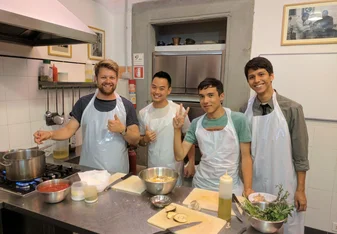Why Global Experience Should Be a College Requirement
The benefits of partaking in a global experience, whether in the form of studying abroad, interning overseas, or taking a gap year to travel, are undeniable. Learn the current state of the study abroad industry, and what organizations are doing to increase participation rates and the diversity of students going abroad during college.

Incorporating an international component into American higher education is critically important for creating a workforce with the capabilities and mindset to tackle the world’s toughest challenges of global interdependence: disease, violent extremism, climate change, economic inequality, and unjust labor practices. On a broader level, individuals with international exposure can better build relationships between people and communities, solve problems, and think creatively. We simply need more of these kinds of people in our world.
Going overseas during university, whether for work, study, or teaching, offers participants tangible and statistically proven results. A recent survey conducted by IES Abroad reports that 76% of students who went abroad during university said they acquired skills that influenced their career path, and 97% reported that studying abroad increased their maturity. Additionally, 98% of study abroad alums reported that studying abroad helped them better understand their cultural values and biases, and 90% said they were influenced to seek out a greater diversity of friends. According to this survey, 52% of study abroad alumni attained graduate degrees.
98% of study abroad alums reported that studying abroad helped them better understand their cultural values and biases
“We believe that more and more employers are realizing the extraordinary benefits of study abroad, and are seeking out graduates who have had study abroad experiences. Key job skills such as adaptability, global understanding and tolerance, leadership, and independence are directly fostered by learning and living abroad,” said Dr. Mary M. Dwyer, President and CEO of IES Abroad.
These benefits are apparent to an even greater degree for college students choosing to participate in internships overseas. “When we talk to candidates, what’s important for us in global investments is people who have an understanding of different cultures, the different ways they communicate and do business,” said Ruth Ferguson, a senior vice president and human resources executive at Bank of America Merrill Lynch.
With All These Benefits, Who Goes Abroad?
According to the 2020 Open Doors Report on International Education Exchange, the number of students who go abroad increased by 1.6% to over 347,000 in the 2018-2019 academic year.
More impressively, the number of U.S. students studying abroad has more than doubled in the last 15 years. The Open Doors report also found that a growing number of students participated in non-credit international opportunities, like internships, research, and volunteer work.
Despite the positive net increase, only an estimated 11% of all undergraduate students in the United States study abroad, and those that do select destinations mainly in Europe (55% of all participants). Compared to just over 3% studying in China, the U.S. needs to increase the overall numbers of students going abroad and broaden the geographic scope of their destinations.
Another issue drawn to the forefront of study abroad conversations is the lack of diversity among the U.S. study abroad population. Although the number of minority students going abroad has risen overall, this segment still only accounts for 31% of American college students studying overseas.
Expanding Access to Studying & Interning Abroad

Photo by Arame N., The Dakar Institute of African Studies (DIAS) Alum
Several organizations are currently tackling these issues and expanding the number and demographic breakdown of students going abroad. In 2014, The Institute of International Education (IIE) launched a national campaign called Generation Study Abroad (GSA), with the stated goal of "increasing and diversifying the number of U.S. students studying abroad" by 2020. At least 168 partners joined GSA during this initiative and established over 600 scholarship programs to promote study abroad. Although this five-year initiative has ended, IEE remains committed to these goals and is still working to advance study abroad.
If we are to effectively prepare today's students to become tomorrow's global leaders, innovators, and agents of change, they must have opportunities to gain direct experience and apply their academic learning in an international setting.
Other leading study and intern abroad companies have designed programs and fellowships specifically to increase access to international programs. Cultural Vistas, a nonprofit exchange organization serving thousands of students, professionals, and emerging leaders in over 130 countries through career-focused international internships, educational study tours, language immersion, and cultural exchange programs in the United States and around the world, is one such organization.
The Cultural Vistas Fellowship funds professional development programs, including eight-week internships abroad, for underrepresented U.S. university students. This year, they are selecting up to 15 fellows to participate in their "first ever Cultural Vistas Virtual Fellowship – a dedicated professional development program that includes eight-week summer remote internships in Argentina, Germany, or Southeast Asia."
"If we are to effectively prepare today's students to become tomorrow's global leaders, innovators, and agents of change, they must have opportunities to gain direct experience and apply their academic learning in an international setting," said Robert Fenstermacher, President and CEO of Cultural Vistas.
Council on International Educational Exchange (CIEE) has also expanding short-term study abroad offerings to increase access to international education opportunities for U.S. undergraduates. CIEE offers certain study abroad prorgrams that are shorter and more cost-effective to help ensure every student has the chance to study abroad. Students can also apply for scholarships and grants to help reduce the cost even further.
With market leaders like IEE, CIEE, and Cultural Vistas recognizing and addressing the issues of access to international experiences in a practical way, the number of students and especially students from a more diverse array of backgrounds will be able to reap the benefits of learning about new parts of the world hands-on.
Program Details
International Experience as a Requirement

Given the significant quantitative and qualitative evidence that global experiences are hugely beneficial for participants' personal and professional career growth, are there institutions that mandate students to study or work abroad?
“International experience is one of the most important components of a 21st-century education, and study abroad should be viewed as an essential element of a college degree,” says Dr. Allan E. Goodman, President of IIE.
It turns out there are. Goucher College made study abroad a requirement in 2006, becoming the first liberal arts college in the country to do so, and Soka University of America soon followed. Soka places a focus on foreign language and takes the idea of global citizenship to the next level, requiring students to study another language. Students at Soka University study abroad for one semester during their 3rd year at no additional cost. Both universities send 100% of their students abroad during their undergraduate programs.
I learned how it feels to be far away from home in a place where you don't really speak the language. I now have an even greater appreciation for international students and immigrants in America.
Students like Hannah Spiegelman, a Goucher College alum, report back positively. Spiegelman says she made her college selection partially because of the requirement and has especially benefited because “everyone goes abroad so it’s a normal part of the Goucher College experience.” Spiegelman added, study abroad “should be something that everyone does as part of their education” because it “shapes you so much as a person,” and nothing can compare to that experience abroad. Similarly, classmate Katherine Mowrer believes it’s “important to me that every student study abroad so that classroom discussions are framed in an international mindset.”
One student, Danielle Hemsley, chose to connect her global experience to her professional development through an internship with Área Logistica Humanitaria (ALH) of Valencia, and says of her time working abroad:
"I learned about business development. I strengthened my ability to conduct Internet research. I became more familiar with international companies and international websites. My Spanish improved. I learned about NGOs, and about Spanish and European culture. I learned how it feels to be far away from home in a place where you don't really speak the language. I now have an even greater appreciation for international students and immigrants in America. I also learned that I am more adventurous than I thought I was."
However, other students, especially those from STEM (Science, Technology, Engineering, and Mathematics) backgrounds struggle with balancing the obvious value of international experience with the completion of a rigorous academic workload. IAESTE, or the International Association for the Exchange of Students for Technical Experiences, was first established in 1948 and now has more than 80 official member countries that host and send students abroad for technical internships each year.
Through IAESTE, which is represented and administered in the United States by Cultural Vistas, students travel to host countries where they complete paid internships at companies, universities, and research organizations.
Remarkably, IAESTE participants receive a stipend that generally covers at least the cost of living. With more programs like this one, international experience as a requirement could become more widespread and thus help more students gain experience, both academically and professionally, abroad.
Program Details
Breaking Down Boundaries

Studying and interning abroad is a life-changing experience. People with experience living overseas bring the world closer together and promote a shared understanding and appreciation of diverse peoples, values, cultures, and aspirations. The organizations championing its permeation into all walks of college student life know that international experience is vital to a healthy outlook and global career. But the unfortunate reality is that gaining these experiences abroad is still not accessible to everyone.
People who live or have lived overseas bring the world closer together and promote a shared understanding and appreciation of diverse peoples, values, cultures, and aspirations.
"International professional experiences are an invaluable investment in one's career and our shared future," said Fenstermacher. “We know that cost remains the most significant barrier that prevents more Americans from reaping the benefits of these opportunities. If we are to succeed in reaching a more diverse range of students, we must continue to showcase the return these investments yield for students, employers, and communities as a whole.”
The challenge is simply opening more affordable and academically cohesive avenues for all students to participate. Whether through working or studying abroad, we learn that the world and opportunities to engage with it are endless. The opportunity to go overseas, therefore, should be equally open, accommodating, and inclusive.



